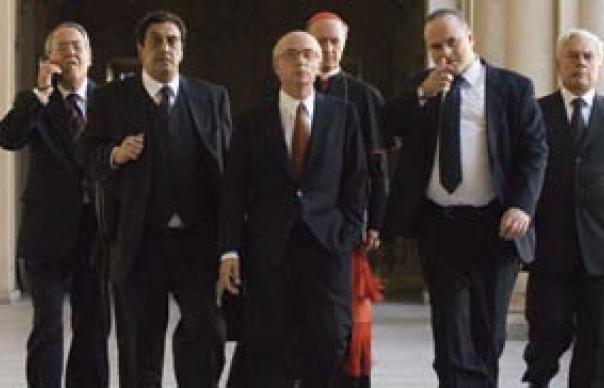By the time he went on trail in 1992, charged with corruption, dealings with the Mafia and his alleged role in the murder of a journalist, Giulio Andreotti had been elected Italian Prime Minister a record seven times. He was known, variously, as “the fox”, “the salamander”, “the divine Giulio” and “Beelzebub”; indeed, according to one character in Paolo Sorrentino's bold and inventive biopic, Andreotti may well be “either the most cunning criminal in the country… or the most persecuted man in the history of Italy.” In fact, occasionally you could be forgiven for wondering whether Sorrentino was telling a story about politicians or mobsters, such is the clandestine world of the Italian Parliament. Certainly, one early sequence, showing the members of Andreotti’s inner circle arriving for a meeting, feels like a gathering of old school Mob capos from a Scorsese film, each one introduced by their nickname (“The Shark”, “The Lemon”, “His Holiness”). To Andreotti, “the deeds that power must commit to ensure the well-being and development of the country... [include] perpetrating evil to generate good.” You might wonder, is this reasoning of a power-obsessed man, willing to consort with the criminal underworld as means to stay in office, or a pragmatic politician who understands the unfortunate necessities of moral compromise? Either way, Sorrentino’s Andreotti (Toni Servillo) remains particularly ambiguous throughout. A strange-looking man – hunched shoulders, folded-over ears and shuffling walk give him a touch of Max Shreck in Nosferatu – with a dry sense of humour, he appears to have none of the charisma of a politician like Clinton or Obama, nor a man-of-the-people earthiness (in fact, the politician he physically most closely resembles is Richard Nixon). But there is certainly something hypnotic about him, whether it’s glimpsing his Sunday ritual of handing out gifts to his poorer constituents or following him on his nocturnal prowls round Rome. In one key scene in the confession booth, the inscrutable mask slips and he admits to feeling guilt at the death of his predecessor Aldo Moro, kidnapped by the Red Brigades and eventually murdered when the government, under Andreotti, refused to negotiate with them. Like Matteo Garrone’s Gomorrah (in which Sevillo also stars), this is an exceptional film about a particularly murky period in Italy’s post-war history. But, unlike Garrone’s gritty, documentary approach, Sorrentino shoots the movie with colour and an operatic gusto. For every quiet scene in Andreotti’s apartment or office, there’s a Scorsese-style flourish – a vicious Mafia execution maybe, a tracking shot, or an adrenalised burst of rock music on the soundtrack. Or a moment of jolting surrealism, such as when Andreotti holds court at a dance party, immobile and deadpan while the other guests whirl and dance round him to a group of drummers. MICHAEL BONNER
By the time he went on trail in 1992, charged with corruption, dealings with the Mafia and his alleged role in the murder of a journalist, Giulio Andreotti had been elected Italian Prime Minister a record seven times. He was known, variously, as “the fox”, “the salamander”, “the divine Giulio” and “Beelzebub”; indeed, according to one character in Paolo Sorrentino‘s bold and inventive biopic, Andreotti may well be “either the most cunning criminal in the country… or the most persecuted man in the history of Italy.”
In fact, occasionally you could be forgiven for wondering whether Sorrentino was telling a story about politicians or mobsters, such is the clandestine world of the Italian Parliament. Certainly, one early sequence, showing the members of Andreotti’s inner circle arriving for a meeting, feels like a gathering of old school Mob capos from a Scorsese film, each one introduced by their nickname (“The Shark”, “The Lemon”, “His Holiness”). To Andreotti, “the deeds that power must commit to ensure the well-being and development of the country… [include] perpetrating evil to generate good.”
You might wonder, is this reasoning of a power-obsessed man, willing to consort with the criminal underworld as means to stay in office, or a pragmatic politician who understands the unfortunate necessities of moral compromise? Either way, Sorrentino’s Andreotti (Toni Servillo) remains particularly ambiguous throughout. A strange-looking man – hunched shoulders, folded-over ears and shuffling walk give him a touch of Max Shreck in Nosferatu – with a dry sense of humour, he appears to have none of the charisma of a politician like Clinton or Obama, nor a man-of-the-people earthiness (in fact, the politician he physically most closely resembles is Richard Nixon). But there is certainly something hypnotic about him, whether it’s glimpsing his Sunday ritual of handing out gifts to his poorer constituents or following him on his nocturnal prowls round Rome. In one key scene in the confession booth, the inscrutable mask slips and he admits to feeling guilt at the death of his predecessor Aldo Moro, kidnapped by the Red Brigades and eventually murdered when the government, under Andreotti, refused to negotiate with them.
Like Matteo Garrone’s Gomorrah (in which Sevillo also stars), this is an exceptional film about a particularly murky period in Italy’s post-war history. But, unlike Garrone’s gritty, documentary approach, Sorrentino shoots the movie with colour and an operatic gusto. For every quiet scene in Andreotti’s apartment or office, there’s a Scorsese-style flourish – a vicious Mafia execution maybe, a tracking shot, or an adrenalised burst of rock music on the soundtrack. Or a moment of jolting surrealism, such as when Andreotti holds court at a dance party, immobile and deadpan while the other guests whirl and dance round him to a group of drummers.
MICHAEL BONNER



